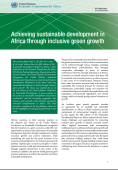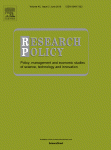The present policy brief draws from an upcoming report by the Economic Commission for Africa (ECA), informed by a survey of nine selected projects in the Lake Victoria Basin complemented with literature, which has established that applying inclusive green economy-related principles and approaches enhances the outcomes of water resource management objectives. This policy brief provides a synthesis of the findings and recommends, among other things, the development and implementation of an inclusive green economy strategy or framework for water resource management in the Basin under the Lake Victoria Basin Commission.
The French version of the policy brief is available here.

This is the first in a series of six briefs, drawn from Achieving Sustainable Development in Africa through Inclusive Green Growth, a joint publication of the Economic Commission for Africa (UNECA), the Food and Agriculture Organization of the United Nations, the United Nations Industrial Development Organization and the United Nations Development Programme on the theme of "achieving sustainable development in Africa through inclusive green growth". This brief provides a snapshot of the key findings, which are further highlighted in subsequent policy briefs in this series.
This policy brief provides an overlook of green growth in a number of sectors, including agriculture, ecosystem goods and services, energy, industry, and trade. It also examines various enablers for the transition toward a green economy.

In 2013, the Nordic Ministers for the Environment decided to strenghten the measurement of green estimates of welfare and socio-economic developments. The report Making the Environment Count is describing how statistics on the environment and the economy thorugh the System of Environmental-Economic Accounts can be used to enable cross-sectorial analysis. The report proposes indicators that can be compiled annually in a Nordic context through existing statistics linking economic statistics to environmental statistics.

Energy efficiency policies play a key role in the transformation to a ‘green energy economy’. The paper takes stock of the impacts of the existing energy efficiency policy instruments in Germany and reviews the energy, environmental and socioeconomic impacts of the country’s latest energy efficiency and climate strategies for the year 2020. The authors find evidence supporting the findings of other studies that enhanced green energy policies will trigger tangible economic benefits in terms of GDP growth and new jobs even in the short term. Whereas policy makers have already acknowledged and implemented this conclusion in the case of renewable energies, the paper shows that striving for more ambitious energy efficiency policies represents a similar win–win strategy, which should be exploited to a much larger extent.

The paper examines the relationship between green innovation and employment from data taken from the Spanish Technological Innovation Panel (PITEC) for period 2007–2011. The increasing relevance of environmental issues for the Spanish economy, its unemployment problem and the uniqueness in its innovation structure make it a proper and interesting context to investigate green innovation dynamics. The authors find a positive relationship between green innovation and employment, and the relationship is stronger for firms in the so-called ‘dirty’ industries. In addition, they show that the relationship is positive for firms that introduce green innovation voluntarily, as compared to firms that introduce green innovation merely to comply with regulations. A positive and significant relationship is also found between employment and firms that report an increase in the degree of importance paid to green innovation.
